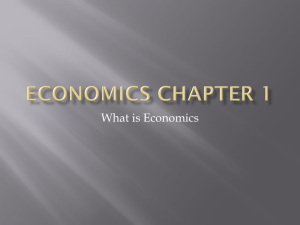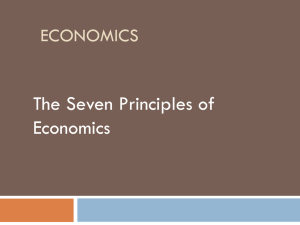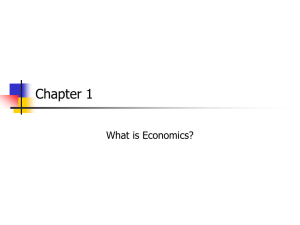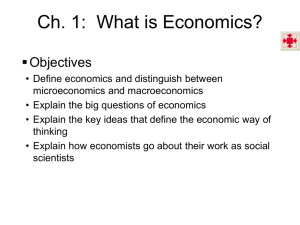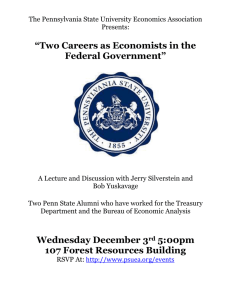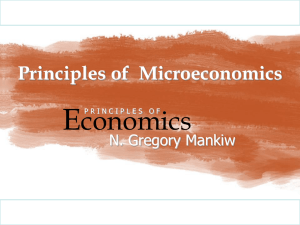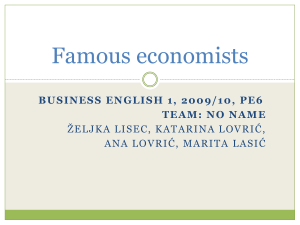Theology, Economics, and Economic Development Peter N. Ireland Boston College
advertisement
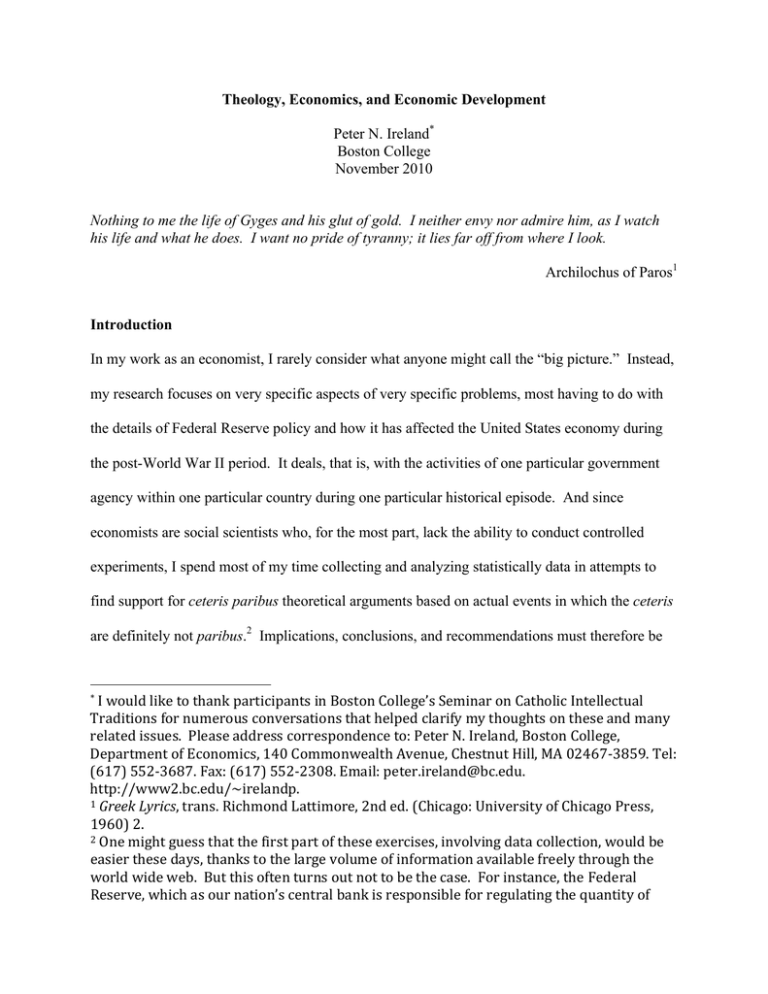
Theology, Economics, and Economic Development Peter N. Ireland* Boston College November 2010 Nothing to me the life of Gyges and his glut of gold. I neither envy nor admire him, as I watch his life and what he does. I want no pride of tyranny; it lies far off from where I look. Archilochus of Paros1 Introduction In my work as an economist, I rarely consider what anyone might call the “big picture.” Instead, my research focuses on very specific aspects of very specific problems, most having to do with the details of Federal Reserve policy and how it has affected the United States economy during the post-World War II period. It deals, that is, with the activities of one particular government agency within one particular country during one particular historical episode. And since economists are social scientists who, for the most part, lack the ability to conduct controlled experiments, I spend most of my time collecting and analyzing statistically data in attempts to find support for ceteris paribus theoretical arguments based on actual events in which the ceteris are definitely not paribus.2 Implications, conclusions, and recommendations must therefore be * I would like to thank participants in Boston College’s Seminar on Catholic Intellectual Traditions for numerous conversations that helped clarify my thoughts on these and many related issues. Please address correspondence to: Peter N. Ireland, Boston College, Department of Economics, 140 Commonwealth Avenue, Chestnut Hill, MA 02467-­‐3859. Tel: (617) 552-­‐3687. Fax: (617) 552-­‐2308. Email: peter.ireland@bc.edu. http://www2.bc.edu/~irelandp. 1 Greek Lyrics, trans. Richmond Lattimore, 2nd ed. (Chicago: University of Chicago Press, 1960) 2. 2 One might guess that the first part of these exercises, involving data collection, would be easier these days, thanks to the large volume of information available freely through the world wide web. But this often turns out not to be the case. For instance, the Federal Reserve, which as our nation’s central bank is responsible for regulating the quantity of stated tentatively, with all of the necessary qualifications, always leaving a host of unresolved issues to be dealt with in future research. Progress is slow but steady. So I really wouldn’t say – as Paul Knitter suggests earlier in this conference volume – that economics is a religion for me. A craftsman builds a nice, sturdy table that is first and foremost functional, but perhaps pleasing to look at as well. I’ll be honest enough to say, at the risk of sounding presumptuous, that I hope my best research articles offer up something of the same, in the form of useful, although narrowly-focused, insights into the workings of the United States economy, drawn from careful and detailed mathematical and statistical analyses that at least a few readers might find aesthetically pleasing. But there’s absolutely nothing in any of my work that even remotely approaches the divine.3 And so it was simultaneously a pleasure, privilege, and welcome change of pace to participate in this Conference on Interreligious Dialog and Economic Development – a chance to take a big step back from my day-to-day work and consider, for once, the bigger issues concerning the effects that the process of economic growth has on the spiritual as well as the material well-being of developing countries and their inhabitants and concerning the ways in which the efforts of economists, or at least those who call themselves economists, get interpreted money in circulation, no longer supplies the public with accurate and coherent data on the money supply, a fact discussed further in some of my recent work: Michael T. Belongia and Peter N. Ireland, “The Barnett Critique After Three Decades: A New Keynesian Analysis,” Working Paper 736 (Chestnut Hill, MA: Boston College, Department of Economics, April 2010). For a related analysis that links the lack of accurate monetary data to policy mistakes, public and private, that may have contributed to the onset and severity of the recent financial crisis, see William A. Barnett and Marcelle Chauvet, “How Better Monetary Statistics Could Have Signaled the Financial Crisis,” Manuscript (Lawrence, KS: University of Kansas, Department of Economics, April 2010). For developing countries, reliable economic statistics are even harder to come by, but that is more understandable, when their governments face far more pressing concerns than getting all of the data up on the world wide web. 3 For the craftsman, though, things might be quite different in this last regard, as suggested by Richard Sennett, The Craftsman (New Haven: Yale University Press, 2008). 2 by scholars outside of my own field. In these post-conference reflections, I’ll argue mainly that theologians and economists agree on far more and to a much greater extent than, probably, the conference papers themselves suggest. But how can we really agree when we seem so much to disagree? Answering this question requires first going back to my day-to-day work, to explain how economists see their job and how economic results may sometimes get misapplied or misinterpreted by economists and non-economists alike. Positive and Normative Economics An example helps illustrate my first point, regarding the nature of economists’ work. In this example, there are two economic actors. One is a late-evening commuter; the other is a robber. The robber approaches the commuter on an otherwise abandoned subway platform and pulls a knife. A threat – “your money or your life” – makes clear the terms of trade. The commuter hands over the money and escapes with his life. One might use the language of economics to call this an “efficient” outcome: both agents are better off with the exchange of money for life than they would have been without. This example is a joke that no one – economist or otherwise – would take seriously. Yet it also provides an illustration of how a theory that relies on the assumption that each individual acts rationally in his or her own self interest can have predictive power, since the most likely outcome is probably the one that the example describes, in which the commuter escapes death and the robber runs off with the money. And it also provides an illustration of an outcome that, however likely, would not be considered just. The example thereby highlights a distinction that economists see themselves as making all the time: the distinction between positive and normative analysis. Most economists use the 3 assumption that consumers, workers, and business owners are rational and self-interested to predict how those economic actors will respond to changes in their environment, such as changes in technologies, government policies, or the availability of natural resources. By doing so, economists as social scientists emulate our colleagues in the physical sciences, seeing the world as it as rather than as we wish it might be. Of course, the conclusions of their positive analyses are going to be influenced by the choices that economists themselves make, as to what factors to consider in detail and what aspects of reality to abstract away from when developing theories and tracing out their implications. At the same time, however, the data provide an unforgiving check against such prejudices and biases. If an economic theory has testable implications that are systematically contradicted by observations of how economic actors actually behave – say because the economist has made assumptions that reflect how he or she would like the world to be in place of assumptions that reflect how the world actually is – then that theory gets rejected and a new one must be found to take its place. That is how the scientific method works. None of this is to say that economists don’t have strong feelings about how the world should be, compared to how it actually is. I myself certainly do. It is simply to say that when, for example, an economist writes that certain provisions of the United States tax code or certain aspects of the way in which technological changes have affected American workers appear to have led to an increase in income inequality, he or she is doing scientific work in economics, making positive statements about the sources of this growth in inequality. And if the same economist later decries that same growth in income inequality, perhaps even using arguments that echo those of theologians, he or she is making normative statements about how the world should be. There is no inherent contradiction, by which doing the first line of scientific work 4 requires one to abandon the moral sentiments that underlie the second lime of normative reasoning. Moving beyond this simple example, where the distinction between positive and normative analysis is easy to make, there is of course a very famous set of results in economics, having to do with Adam Smith’s “invisible hand” and the theorems of welfare economics presented by Kenneth Arrow and Gerard Debreu, which demonstrate that under certain circumstances, the rational and self-interested actions of individual consumers, workers, and business owners generate equilibrium resource allocations that are Pareto optimal, that is, give rise through free and voluntary exchange to outcomes in which it is impossible to make anyone better off without making at least someone else worse off.4 Here is where the lines begin to blur, because these theorems do connect what is and what in a very particular sense – some would say a very peculiar sense – should be. Although all economists recognize that the conditions required for the welfare theorems to hold are stringent, I concede that many of us display a tendency to forget this and therefore jump too quickly to make the claim that free markets deliver optimal outcomes. As well, many economists too frequently forget that what might appear at first glance to involve free and voluntary exchange often involves elements of coercion that are disturbingly similar to those described in my joke example from above. So let’s consider this a first point of agreement, 4 See Adam Smith, An Inquiry Into the Nature and Causes of the Wealth of Nations, ed. Edwin Cannan (New York: Modern Library, 1937) 423. See also Kenneth J. Arrow, “An Extension of the Basic Theorems of Classical Welfare Economics,” in Proceedings of the Second Berkeley Symposium on Mathematical Statistics and Probability (Berkeley: University of California Press, 1951) 507-­‐532; and Gerard Debreu, Theory of Value: An Axiomatic Analysis of Economic Equilibrium (New Haven: Yale University Press, 1959). Finally, for a very forthright expression of the unease with which a Nobel-­‐prize-­‐winning economist views popular applications and interpretations of these ideas and results, see Joseph E. Stiglitz, “The Invisible Hand and Modern Welfare Economics,” in Information, Strategy and Public Policy, ed. David Vines and Andrew A. Stevenson (Oxford: Basil Blackwell, 1991) 12-­‐50. 5 though one that economists as well as theologians should more frequently remind themselves of: that all too often, a very large gap persists between what is and what should be. The Invisible Hand and the Environment Although, yes, economists probably do overestimate the extent to which free markets give rise to desirable outcomes as predicted by the welfare theorems of Arrow and Debreu, here is a second point on which theologians and economists can agree: that unregulated free markets generally lead to excessively rapid natural resource depletion and undesirable if not disastrous environmental degradation. Statements like the following, taken from a leading undergraduate economics textbook, can in fact be found quite easily: Economists use the term market failure to refer to a situation in which the market on its own fails to produce an efficient allocation of resources. As we will see, one possible cause of market failure is an externality, which is the impact of one person’s actions on the well-being of a bystander. The classic example of an externality is pollution.5 More advanced textbooks in economics go much further, to adapt narrower but more conventional measures of national income, such as gross domestic product, so as to account appropriately and fully for changes in environmental quality, thereby introducing the notion of sustainability into theories of long-run economic growth.6 Among economists, even those who approach the topic with skepticism agree that the Clean Air Act of 1970 and its various amendments have been crucial to improving 5 N. Gregory Mankiw, Principles of Economics 5th ed. (Mason, OH: South-­‐Western Cengage Learning, 2009) 11. 6 See, for instance, Martin L. Weitzman, Income, Wealth, and the Maximum Principle (Cambridge: Harvard University Press, 2003). 6 environmental quality in the United States.7 And even those who criticize harshly the design of the Kyoto Protocol assert that the United States and other high-income countries must take the lead in the fight against global climate change by unilaterally adopting government policies that curtail greenhouse gas emissions.8 Indeed, something of a consensus – a rarity among economists and, I assume, among theologians as well – has emerged from the many economic studies of global climate change, calling for governmental policies that take effect immediately and gradually impose tighter and tighter restrictions on emissions.9 Economists and Economic Policymakers “Beware of false prophets ….” That’s something that theologians have said all along, but which economists are now learning the hard way. Hence, it has become another point on which we all can agree. The most popular account of the economic history of the past three decades runs as follows. The election of Margaret Thatcher as Prime Minister of the United Kingdom in 1979, followed by the election of Ronald Reagan as President of the United States in 1980, marked a fundamental shift in two of the world’s biggest and richest economies, away from a system dependent on government intervention and towards the unfettered workings of the free market. These changes accelerated and spread further and further throughout the world following the collapse of the Soviet Union in 1991. At first the gains seemed impressive, with high rates of 7 See A. Myrick Freeman III, “Environmental Policy Since Earth Day I: What Have We Gained?” Journal of Economic Perspectives 16 (Winter 2002) 125-­‐146. 8 Warwick J. McKibbin and Peter J. Wilcoxen, “The Role of Economics in Climate Change Policy,” Journal of Economic Perspectives 16 (Spring 2002) 107-­‐129. 9 See William D. Nordhaus, “A Review of the Stern Review on the Economics of Climate Change,” Journal of Economic Literature 45 (September 2007) 686-­‐702, especially footnote 3 on page 687. 7 growth recorded in income and wealth, albeit distributed unequally both within and across countries. Yet even for the relatively fortunate, the apparent prosperity turned out to be an illusion, based largely on speculative activity financed with borrowed money. Eventually, the bills came due, and in 2007 and 2008 the world economy plunged into its deepest contraction since the 1930s, where it remains mired today, with little sign of meaningful recovery. My purpose here is not to take issue with this popular account of recent history, to point out ways in which it may be oversimplified, incomplete, or inaccurate. Instead, my focus is on the story itself, particularly the fact that within this story, many of the biggest apparent heroesturned-villains are economists – or at least people who are popularly viewed as being economists. And chief among them stands Alan Greenspan, Chairman of the Federal Reserve System from 1987 through 2006. But, truth be told, few of my colleagues would recognize Alan Greenspan as a serious economist. He holds a doctorate in economics, but one received under somewhat dubious circumstances many years after he left New York University, the degree-granting institution.10 On those grounds alone, Alan Greenspan should be considered unqualified to teach even introductory-level college classes in economics, let alone hold a regular faculty position at an American university. And my own sense is that the feeling is mutual: as Federal Reserve Chairman, Alan Greenspan appeared at best uninterested in, and often openly hostile to, the research agendas pursued even by his own staff of PhD economists at the Federal Reserve Board. Alan Greenspan did hold government positions – all them unelected – throughout most of his career, culminating in his lengthy term as Federal Reserve Chairman, for which he is most famous. I therefore suggest that it would be both fairer and more accurate to call Alan 10 Robert D. Auerbach, Deception and Abuse at the Fed: Henry B. Gonzales Battles Alan Greenspan’s Bank (Austin: University of Texas Press, 2008) 36-­‐38. 8 Greenspan an “economic policymaker” rather than an “economist.” And, as an economic policymaker, the popular account of history probably gets it right: Greenspan’s biggest legacy stems from the many years during which he overlooked his institution’s public duties as a bank regulator, responsible for ensuring the safety and soundness of the American financial system. Indeed, Greenspan’s expression of “shocked disbelief” during his October 23, 2008 testimony before the Congressional Committee on Oversight and Government Reform might remind theologians, economists, and many others of the sorts of statements that used to come from Bernard Francis Law’s office. Hearing these things leaves one wondering, reasonably, whether either man, even after being confronted with the evidence, will ever fully appreciate the depth of the tragedy that happened under his watch. Of course, there is no governing body – local, national, or international – that certifies or licenses those who wish to call themselves “economists” the way, for example, there is for medical doctors, barbers, and other trained professionals. Still, it needs to be emphasized that other major figures involved in economic policymaking just before, during, and after the United States financial crisis of 2007 and 2008 also lacked formal training that would qualify them as economists. Henry Paulson, Secretary of the United States Treasury under President George W. Bush when the crisis began to unfold, holds an MBA from Harvard and worked for Goldman Sachs from 1974, serving as the investment bank’s Chairman and Chief Executive Officer beginning in 1999, up until his nomination to public office in 2006. As Treasury Secretary, therefore, Paulson was a former investment banker with longstanding and rather strong professional ties to one of the firms that he was charged with overseeing and that, ultimately, benefited enormously from the United States government’s unprecedented involvement in the financial markets during October 2008. 9 Perhaps deeper investigations, conducted after everyone’s memoirs get published, will reveal that Henry Paulson was as tough on his former firm as he would have been on any other individual who or institution that asked for the Bush Administration for federal assistance and was turned away. Perhaps those investigations will show that Goldman Sachs and other large financial institutions were simply much more deserving as welfare recipients than, for instance, many of the families that felt slighted by the government’s feeble response to Hurricane Katrina just a few years earlier. It could be. But, based on information that is available now, there would appear to be at least the possibility of troublesome conflicts of interest behind the very generous treatment given by the United States Treasury to the big investment and commercial banks in 2008, following a quarter century of deregulation, fiscal austerity, welfare reform, and reliance on the blind justice of the free market. Finally, Timothy Geithner, President of the Federal Reserve Bank of New York during the early stages of the crisis and, later, Henry Paulson’s successor as Secretary of the United States Treasury, does hold a master’s degree in international economics from the Johns Hopkins University. And, to be sure, it stands as a truly remarkable accomplishment, reflecting enormous talent of some kind or another, that Timothy Geithner, who just before his Senate confirmation hearings in January 2009 revealed himself to be someone incapable of correctly filling out his own federal income tax forms, now heads up the United States Treasury, which includes the Internal Revenue Service as one of its major divisions. Yet however admirable his personal success in overcoming this handicap and rising to power, Timothy Geithner, like Alan Greenspan, lacks strong academic credentials and has no record of scientific or scholarly achievement. Instead, also like Greenspan, he has spent most of his career in unelected government positions: he is an economic policymaker but not an economist. 10 Ironically, it was a true economist – a University of Chicago economist, in fact – who sounded the loudest and clearest alarm in the years leading up to the crisis. In a paper presented – even more ironically – at a 2005 Federal Reserve conference honoring Alan Greenspan, Raghuram G. Rajan warned that developments in the United States financial system, including the strong trend towards deregulation, had given rise to an environment in which fund managers had greater incentives than ever before to take on risk, to conceal that extra risk, and to engage in herd-like behavior that amplifies both upward and downward swings in asset prices.11 Rajan went on to describe how “tail risks” – extreme events that occur with low probability – could trigger a “catastrophic meltdown” that resembles quite closely the crisis that did indeed occur just a few years later. And the fact that when the crisis did occur, it was interpreted by many as decisive evidence against the efficient markets hypothesis, which posits that prices in financial markets accurately and rationally reflect all information available to traders in those financial markets, strikes me as the biggest irony of all.12 To the contrary, in September 2008, the financial markets priced commercial paper issued by Lehman Brothers and AIG perfectly, identifying quite exactly what that paper was worth: zero. Those were insolvent institutions that should have been placed into receivership and liquidated in the same way that, for instance, bankrupt savings and loan institutions were disposed of during the previous United States financial crisis in the 1990s. Scarce taxpayer funds would then have been available to help the truly needy, instead of going to 11 Even the title of the conference volume in which Rajan’s paper appears takes on a new, and almost laughable, significance when viewed against the backdrop of the events that soon followed: see Raghuram G. Rajan, “Has Financial Development Made the World Riskier?” in The Greenspan Era: Lessons for the Future (Kansas City, MO: Federal Reserve Bank of Kansas City, 2005) 313-­‐369. 12 For a brief introduction to the efficient markets hypothesis, see Mankiw, Principles of Economics, 606-­‐607. 11 help pay the extraordinary salaries and bonuses awarded to executives at those and other financial institutions that were driven to brink of failure and beyond by managers and regulators who were unwilling to control the risks outlined so clearly by Rajan. But economic policymakers chose to ignore Rajan’s warnings in 2005. And even today, five years later, no one from the Federal Reserve or the United States Treasury – nor for that matter any economist from any institution – has offered up any sort of convincing explanation as to why it was necessary for the United States government to intervene in the economy so heavily in 2007 and 2008, on behalf of what had been some of the biggest and most profitable financial institutions in the history of the world. Some still assert, without supporting evidence, that if the government had not intervened to save the big banks, the broader economic downturn that followed would have been far worse. But John Taylor’s extensive analysis shows, to the contrary, that the worst of the financial crisis actually followed testimony given by Treasury Secretary Henry Paulson and Federal Reserve Chairman Ben Bernanke to the United States Senate Banking Committee on September 23, 2008, asking for $700 billion in aid to rescue what would otherwise have been bankrupt financial institutions.13 Taylor’s observations suggest that the government bailout worsened, rather than ameliorated, the financial crisis and its aftereffects. Again, all the signs that are visible now point to the large financial institutions themselves as the biggest, and perhaps even the sole, beneficiaries of the United States government’s renewed involvement in the economy in 2008. In mentioning all of this, I suppose that I am calling for an elaboration on the popular account of recent history after all. A more complete and comprehensive account of that history, it seems to me, would have to observe that both the financial crisis and the subsequent policy 13 John B. Taylor, Getting Off Track: How Government Actions and Interventions Caused, Prolonged, and Worsened the Financial Crisis (Stanford: Hoover Institution Press, 2009). 12 responses reflect the workings, not of markets that are truly free, supervised by trained economists and competent regulators who would have recognized that when free markets work efficiently, they do so partly because they deem no business “too big to fail,” but rather the successful efforts of the rich, the greedy, and the politically well-connected to use government coercion for their own further enrichment.14 As common as it is, this sort of perverse redistribution of wealth, away from the most needy and towards the most affluent, remains something to be abhorred, regardless of whether it occurs under a socialist dictatorship, an oppressive theocratic regime, or a representative democracy. And that point, too, is one upon which theologians and economists can agree. Conclusion The Notorious B.I.G. – who was quick to point out that he himself held no doctorate in theology, economics, or any other field – famously lamented that, all too often, more money simply leads to more problems.15 True enough. And, likewise, economic development is usually accompanied by the emergence of new problems, which many of the papers in this conference volume usefully point to. Certainly, it is quite easy to find in the United States, the world’s richest economy, vulgar displays of conspicuous consumption. And globalization seems to bring with it a spread of that same kind of vulgarity, which becomes all the more tragic when it erodes noble habits, displaces worthy traditions, and disturbs more peaceful ways of life. 14 For a more thorough account of the financial crisis along exactly these lines, as well as a more nuanced and compelling account of recent United States history that identifies the myriad of social, cultural, and political as well as economic forces that set the stage for the crisis, see Etay Zwick, “Predatory Habits: How Wall Street Transformed Work in America,” The Point (Winter 2010) 33-­‐46. 15 The Notorious B.I.G., “Mo Money, Mo Problems,” Life After Death (New York: Bad Boy Records, 1997). 13 But while, thus far, I’ve emphasized that there are quite a few points of agreement between theologians and economists, I’d like to finish by suggesting that it might be a mistake to conclude, just yet, that economic growth is on balance a bad thing. To defend this claim, I would cite the obvious case studies, comparing living standards in North Korea to those in South Korean and in the stagnant economies of Africa to those in the rapidly expanding economies of Asia. I would refer to the evidence showing strong correlations between gross domestic product as a measure of national income and other, more important, things that theologians and economists should really care about, like life expectancies and literacy rates.16 I would point to recent work with the World Values Survey and the Gallup World Poll, which has cast doubt on the so-called Easterlin paradox that an economy’s level of development bears no relation to the average level of happiness expressed by those who populate that economy.17 Finally, I would mention with some hope the evidence that associates rising income within a country at first with a decrease, but later with an increase, in environmental quality.18 Apparently, wealthier people do choose to spend more of their income in order to enjoy the benefits of a cleaner environment. More money, by itself, won’t save the world. But perhaps, through this last channel, more money might at least be of some help. 16 See the table of statistics presented by Mankiw, Principles of Economics, 523. 17 For a comparison, see Richard A. Easterlin, “Does Economic Growth Improve the Human Lot? Some Empirical Evidence,” in Nations and Households in Economic Growth: Essays in Honor of Moses Abramovitz, ed. Paul A. David and Melvin W. Reder (New York: Academic Press, 1974) 89-­‐125 and Betsey Stevenson and Justin Wolfers, “Economic Growth and Subjective Well-­‐Being: Reassessing the Easterlin Paradox,” Brookings Papers on Economic Activity (Spring 2009) 1-­‐87. 18 See Gene M. Grossman and Alan B. Krueger, “Economic Growth and the Environment,” Quarterly Journal of Economics 110 (May 1995) 353-­‐377. 14
